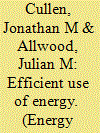| Srl | Item |
| 1 |
ID:
093472


|
|
|
|
|
| Publication |
2010.
|
| Summary/Abstract |
The efficient use of energy is a key component of current efforts to reduce carbon emissions. There are two factors which are important when assessing the potential gains from energy efficiency technologies: the scale of energy flow and the technical potential for improvement. However, most efficiency analyses consider only the potential gains from known efficiency technologies, while ignoring the complex flow of energy through the chains of conversion devices. In response, this paper traces the global flow of energy, from fuels through to the final services, and focuses on the technical conversion devices and passive systems in each energy chain. By mapping the scale and complexity of global energy flow, the technical areas which are likely to deliver the largest efficiency gains can be identified. The result is a more consistent basis for directing future research and policy decisions in the area of energy efficiency.
|
|
|
|
|
|
|
|
|
|
|
|
|
|
|
|
| 2 |
ID:
180863


|
|
|
|
|
| Summary/Abstract |
Delivering net zero by 2050 will require governments to utilise all available abatement opportunities, yet current policy largely ignores socially-driven mitigation in favour of technological innovation in the energy sector. Past energy transitions have typically taken several decades, but policymakers remain confident that low carbon technology can be deployed in time for a 2050 mitigation target. We consider the potential for social transitions to deliver emissions reductions within this time frame. Based on detailed analysis of 12 past transitions, we develop frameworks for technological and social transitions which draw out the relationships between progress, policy and diffusion. Using our generalised frameworks we compare the duration of transitions, finding that the technological transitions in our study take on average four decades longer than the social transitions to go from initial conception to market or behaviour saturation. Our evidence suggests that policymakers who continue to rely on technology transitions to reduce emissions will be unable to deliver climate targets by 2050. By engaging with the public to stimulate social transitions governments could have more impact, more swiftly. Only by utilising both technological and social transitions can policymakers hope to achieve net zero emissions by 2050.
|
|
|
|
|
|
|
|
|
|
|
|
|
|
|
|